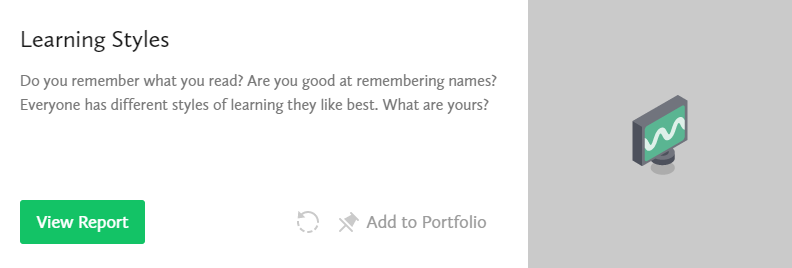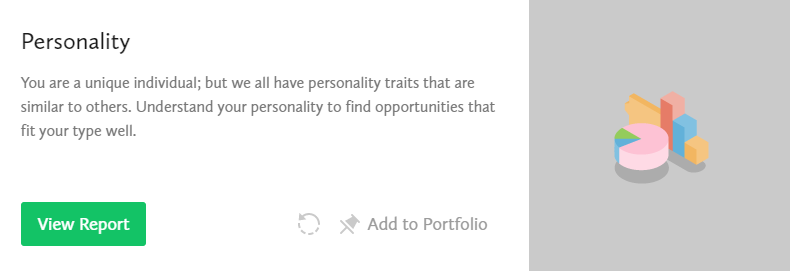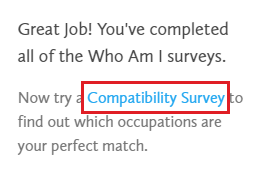The Who Am I Surveys are designed to help students learn more about themselves and the potential occupation matches based off of the completed survey results. Read below to learn more about the theories and frameworks that were used to create the surveys.
Pro-Tip: as a teacher, you can complete Who Am I surveys from the Student View (located at the top right) within your teacher account.
Learning Styles Survey
The Learning Styles Survey is based on three key learning styles - Auditory, Kinesthetic, and Visual. Whatever results you may receive, it is always best to learn something by trying to use all three Learning Style approaches whenever possible. Since different activities use different parts of our brain, when we use different ways to do or learn the same thing, our minds do a better job of learning and remembering.
When it comes to learning, always play to your strengths – use your strongest learning style(s) first - but be willing to try different approaches. When you’re learning something, using your strengths first will help you grasp what you’re learning more quickly. Once you’ve done that, trying a new technique can help you remember and lead you to an even better understanding of what you’ve learned.

Personality Survey
The Personality Survey is based on work published by Carl Gustav Jung in his text Psychological Types. He described certain perspectives and preferences that he felt could be used to define, understand, and explain a personality. His work along with the work of others such as (Myers, Briggs, Kiersey) have led to the identification of four different Personality Spectrums, each with two opposing Preferences. When taken in combination, these four Spectrums describe sixteen distinct personality types as identified by where individual preferences fall on each.
It’s important to always remember that each of us use each of the four Spectrums and the eight Preferences at various times but we will all have favoured Spectrums and Preferences that we will use more often. These favourites are what help to define each of our Personality Types. Further, Personality Typing is a tool not a test! The Personality Type framework can help each of us understand what makes us (and those around us) tick and allow us to amplify our areas of strength.

Interests Survey
The Interests Survey is based on psychologist John L. Holland’s theory of careers and vocational choice which outlines six occupational themes, each with its own set of generalized interest themes and attributes. While these categories are a simplification of the complex idea of interests and personality, they offer a framework for mapping an individual’s preferences to occupations that are a good match with the individual as each occupation has characteristics that are a good fit to two to three of these types.

Knowledge Survey
The Knowledge Survey consolidates curriculum into 10 core subject areas and breaks down the common learning objectives for each. Each subject area has common themes and strands that you will commonly learn about within the topic. Discovering what you’d like to learn and the knowledge you are interested in attaining allows you to identify courses, programs, and other learning opportunities you may wish to explore within your education and career path.

Motivations Survey
The Motivations Survey relies on the Theory of Work Adjustment by René Dawis, George England and Lloyd Lofquist from the University of Minnesota. This work suggests that the more closely the rewards of a particular job or occupation match the motivating factors of an individual, the more likely it is that the individual will find their work satisfying. According to their findings, job satisfaction is one of the predictors of workplace success.
Knowing what motivates us can help lead us towards an occupation that we’ll find satisfying and through satisfaction, find success - if we have the knowledge and abilities to perform our work. The Theory of Work Adjustment outlines six key motivators that individuals seek to satisfy.

Compatibility Survey
The 500+ Compatibility Surveys explore the actual work tasks and activities within real-world occupation based on data from the Department of Labor and the Standard Occupational Classification system. It is important to understand the realities of a job to determine your potential match for any occupations that may interest you.



